PHILADELPHIA, 28 September –- Gamification Lecture 8: Enterprise Gamification with Kevin Werbach of the University of Pennsylvania’s Wharton Business School, Week 5!
Particular challenges and opportunities when applying gamification inside an organization.
CLASS NOTES – PART 9 – Enterprise Gamification
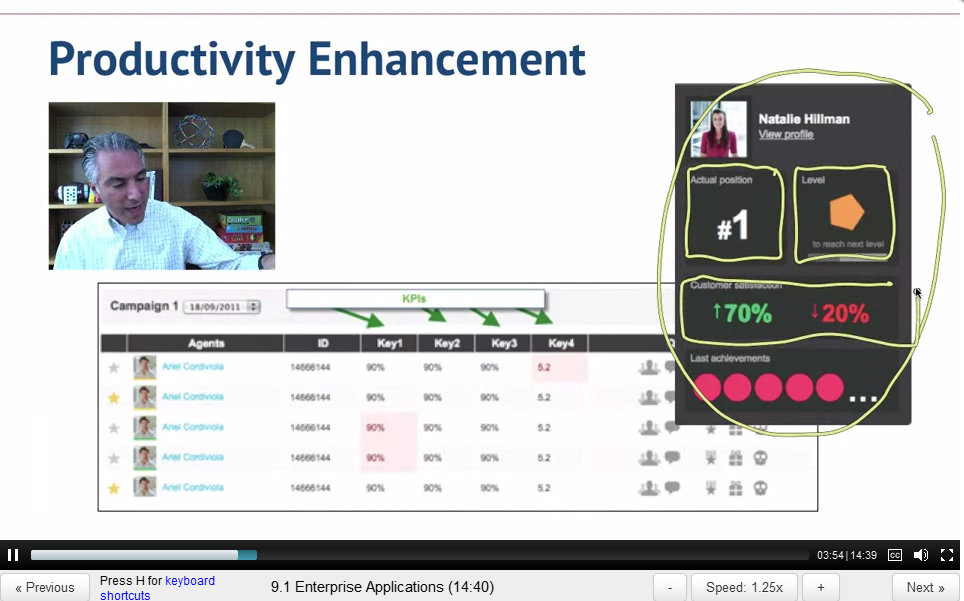
9.1 Enterprise applications
this week moving from external to internal: in the enterprise, in the large organization.
1. Intranet / Extranet
peeps with expertise, works like Stack Overflow
use gamification techniques to enhance the quality of discussion
2. Productivity Enhancement
motivating employees to do their job better
eg: Call Centers – want agents to deal with customers Quickly, and Well
starting to look to gamification to encourage better performance
Employee: Badge Bookshelf
Company: KPI Dashboard (Key Performance Indicators)
this can also be oppressive and counterproductive
3. Efficiency Enhancement
points for quickly disposing of your email
4. Knowledge Management
Deloitte – “WhoWhatWhere”
they have people all over the world with tremendous knowledge, but don’t necessarily know about each other — gamification can encourage that kind of sharing
5. Human Resources
• Hiring – playing games can tell you a lot about people
• Onboarding
• Acculturation
• Corporate Training
• Performance Review
• Employee Recognition
• T & E (travel & entertainment) Google – if you don’t use your limit on 2 city trip you can: Bank it, Give it to charity, cash out (@discount)
6. Innovation
7. Serious Games
Siemens – “Plantville” – game of managing manufacturing plant
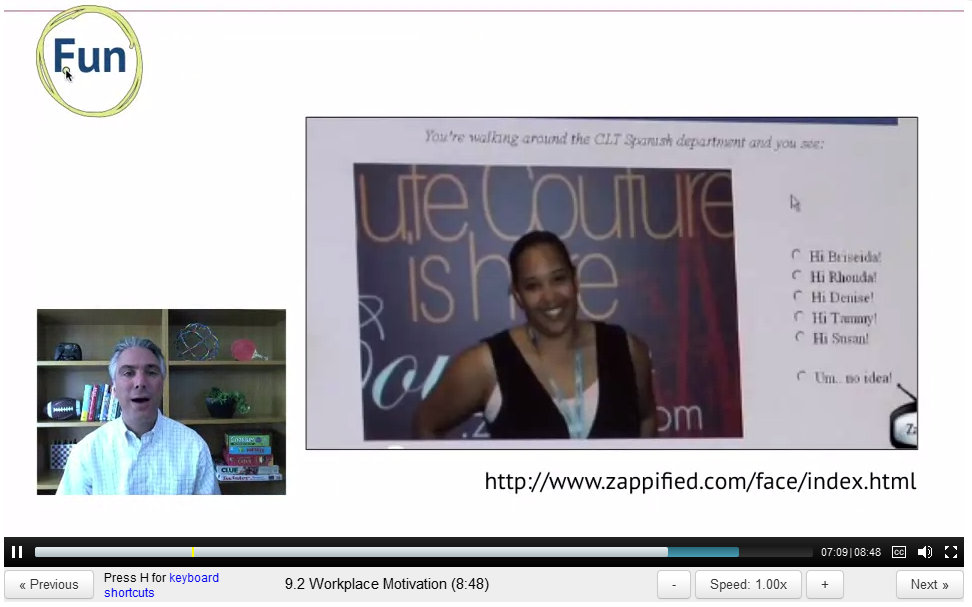
9.2 Workplace motivations
What motivates people at work?
Rewards: Pay, Bonuses, Stock Options, Praise, Promotions, Responsibility
All the traditional kinds of levers >> almost entirely Extrinsic motivators
Not the whole story!
Something beyond external rewards > Opportunity for Gamification!
• Skill Development
eg: liveops – virtual call center
• Corporate Citizenship
eg Microsoft Employees reviewing language localizations
— inherent fun of game
— competition between offices
— help their company make better products
• Fun
Zappos > The Face Game
Learn your co-worker game
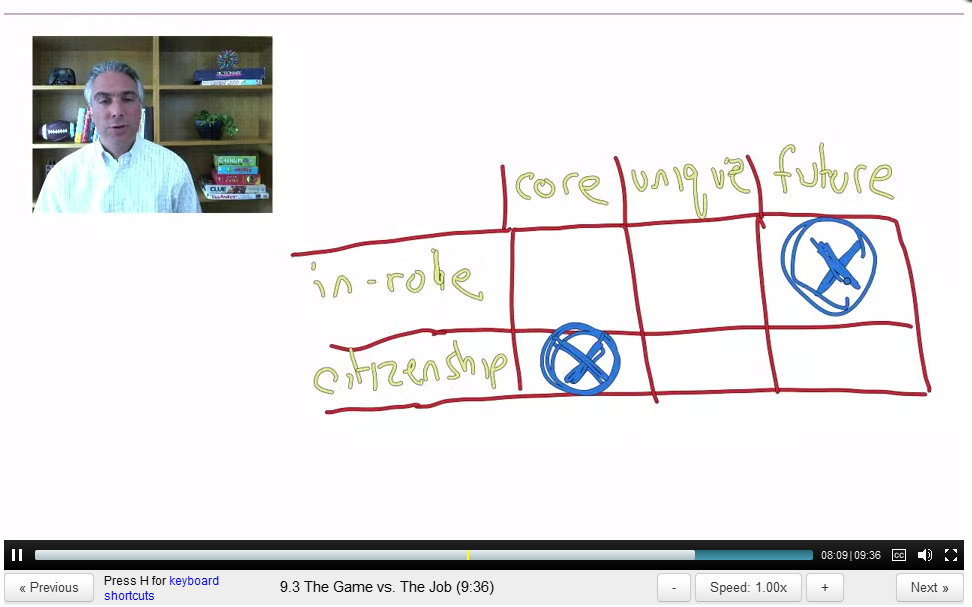
9.3 The Game vs. The Job
eg: points for speed in call center & they’ll tend to not really serve customers
Citizenship Behaviors
• Altruism
• Conscientiousness
• Civic Virtue
• Courtesy
• Sportsmanship
Ross Smith – Microsoft
In Role Behavior – your job
Citizenship Behaviors – good corporate citizen
Core Skills – everyone in org has
Unique Skills – limited to particular employee
Future Skills – employee wants to obtain
Core::Citizenship (Language Quality Game)
In-Role::Future Skills
Enterprise gamification requires a close attention to matching up aspects of game and workplace objectives.
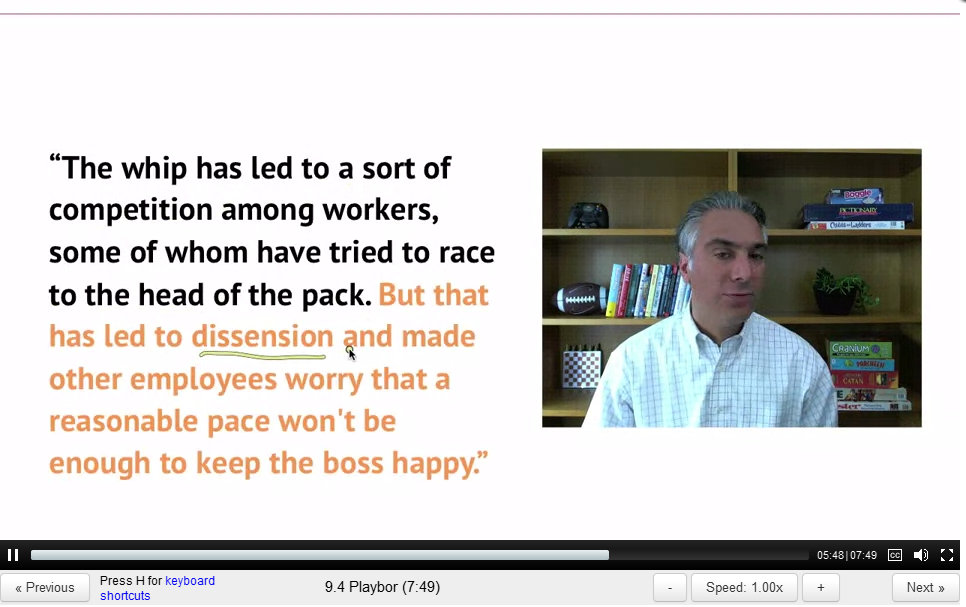
9.4 Playbor
Is the game truly voluntary?
Play + Labor = Playbor
Game = Voluntary, so any work thing can’t be Play…
What if your employer puts gamified elements in your workflow?
like Target screen that reports checkout times, but is also “big brother” monitoring your every move – external, extrinsic controls – where’s the play? where’s the game aspects?
Conceptual – is it gamification
Practical – is it a good idea
Are these manditory systems ethical and effective for the worker?
Disneyland employees call the houskeeping leaderboard “the electronic whip”
(self determination theory <– autonomy
feedback is controlling, not informational – can demotivate
How can Leaderboard motivate and not lead to a Lord of the Flies "all against all"
– voluntary
– transparent
9.5 Daniel Debow interview
Canadian Startup – Rypple (recently acquired by SalesForce.com)
Daniel Debow, VP, Salesforce, Rypple
Rypple amplifes behavior – coaching, goal setting, recognition for great work
we never thought about “games” but just “How do we design a great game?”
we only used “gamification” to amplify things that are intrisically rewarding
people like to give feedback – what if we could make giving feedback the core of the solution
then manage that experience in different ways
people send emails to each other all the time, “hey great job Kevin, let me cc your boss”
people have “badges” around their desk – nobody cares about the *thing* but the *meaning* of it
purple ribbon & piece of metal – could mean everything, or nothing
Facebook started with real life behaviors
— writing on dorm room walls
— looking at facebooks
• be empirical – try things – see what actually happens
• lots of experiments
• lots of iterations
— your theories about how people behave might just be wrong
Optional Materials
Ross Smith, The Future of Work is Play, 2011
JP Rangaswami, Does Gamification Create Real Business Value? Part 2, I-CIO, June 28, 2012
Rypple, Work Better. Play Together? On Enterprise Gamification, March 11, 2011
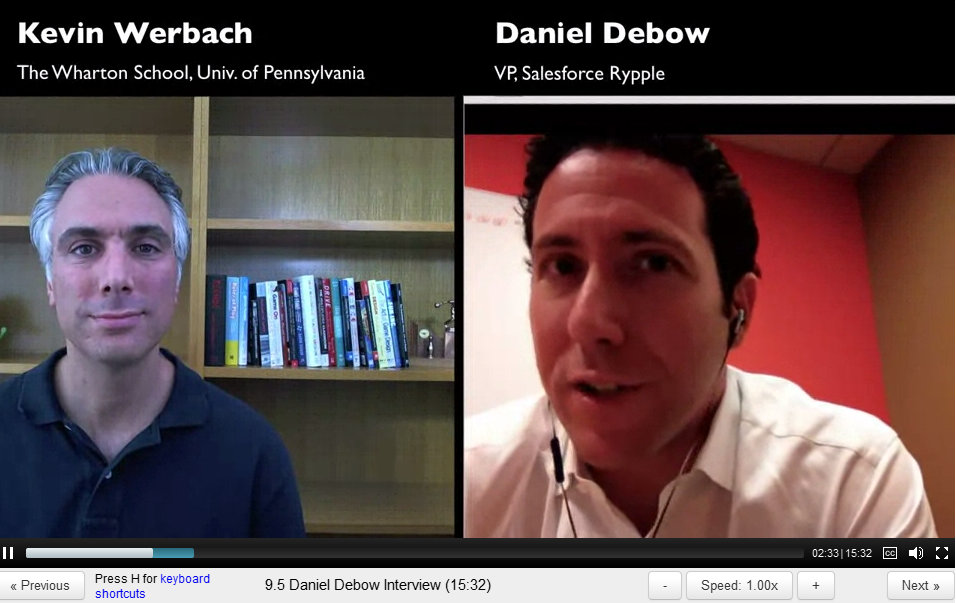

















1 thought on “Gamification 9 – Enterprise Gamification”